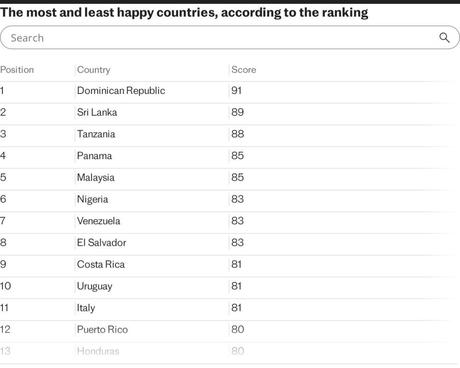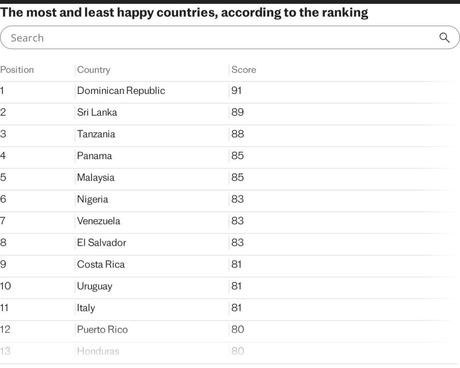There's always someone else worse off, right? Here we look at Uzbekistan, the only country to score lower than Britain in a global index of mental wellbeing. Yes, we are more miserable than Moldova. Bluer than Belarus. Even Yemen and Ukraine are apparently in a better mood. First world problems just became real.
Measuring mental well-being is a difficult matter. But US nonprofit Sapien Labs has gotten to work on its Mental State of the World report, the latest edition of which has just been released. Using data from 500,000 respondents in 71 countries, it measures how people's "internal states influence their ability to function within their life context." In other words: mental well-being in relation to the environment.
The results suggest that despite experiencing a humanitarian disaster, Yemenis are functioning better in relative terms than not only the British, but also the Australians and Irish.
Right. Forgive us for not moving to downtown Sana'a yet. Wealthy Western countries generally performed poorly, with researchers noting: "Greater prosperity and economic development do not necessarily lead to greater mental well-being."


Are things really that bad in Blighty? Does our stiff upper lip really tremble? The equally dubious, but somewhat woollier World Happiness Report doesn't think so. The country places Britain 19th in the index of the happiest countries, between the Czech Republic and Lithuania. Yet it would take weapons-grade patriotism to survey our country and conclude that all is well. The Office for National Statistics recorded an overall decline in personal well-being across Britain in 2023. Meanwhile, the charity Mind is warning of a developing mental health crisis, especially among men and young people.
It's no wonder that wellness retreats are booming. Last year I visited one in Cornwall, run by ex-rugby pro Anthony Mullally. Mullally is not your archetypal wellness guru. He doesn't drink kale or cuddle you for too long. In fact, he's six feet tall, with a Scouse twang, bulging biceps, long red hair and the look of a man whose ancestors arrived in England on a longboat.
The story continues
His retreats are designed to equip the kind of men with an innate distrust of kale with the techniques they need to "stay stable in a chaotic world." I must say it has calmed me down.
But tensions abound. Money is tight. The healthcare system is creaking. The sea is full of poop. Our Hogarthian town centres, with their boarded up shops and rough sleepers, are yet more signs of a struggling nation.
"We need to find a new identity," an Ilkeston resident told me recently in the remote town of Derbyshire. Once an engine room of the Industrial Revolution, it is now best known for its ATM - currently the top-rated attraction on TripAdvisor. "Typical Ilkeston humour," another resident told me. I suppose it's reassuring that the British sense of mischief continues.
Where, you may wonder, did things go wrong? Choose your villain. Covid. Putin. Brexit. The wokerati. Rigidity. Bojo. Ulez. The Lettuce Prime Minister. The anti-growth coalition. Blair. The Internet. Hmmm. The Internet.
Adding to the growing body of evidence, Sapien Labs identifies a link - not just in the UK, but globally - between poor mental wellbeing and the ubiquity of smartphones and online communications. The fact that young people have suffered the biggest declines in mental well-being seems to strengthen their argument. Ditto the fact that less technological countries, such as Sri Lanka and Tanzania, are among those achieving better well-being scores. Stronger family ties in those countries were also linked to better mental health.
So the internet has a lot to answer for. It has, of course, facilitated the work-from-home phenomenon that quieted our cities post-Covid. It sent dating and retail online, fueled the culture wars and, research shows, distracted us from having sex. No wonder we are gloomy. Has it also robbed us of a soundtrack for these strange times? In the early 1990s, there was at least a musical movement to uplift the nation. Little chance of a unifying Britpop 2.0 in the streaming age, with its fragmented, fickle audience. No wonder we're in the middle of the hazy nostalgia of the 1990s: when the mullet is back, you know you're in trouble.
"Everything is now online, the shops are closed." It's a lament I've heard repeatedly during my travels around the country for this newspaper. Our sense of place, it seems, has disappeared. We are adrift in the digital ether. Lost and lonely on our screens. Plagued by bad news.
Maybe that's too convenient a story. Like the Mental State of the World report, it only tells part of the story. Another story is of resilient communities in the UK, who like Ilkeston have risen to establish newspapers where theirs have folded, grow food in communal spaces and even take over post offices.
They have also united to save our beloved pubs, putting these community centers into the hands of the people who use them. According to the British Beer & Pub Association, Britain has lost six percent of its pubs in the past six years - reason enough to be gloomy. Over the same period, the number of community-owned pubs has increased by 63 per cent. My local, the Ivy House in Nunhead, a cornerstone of our neighborhood, was London's first, but not last. Even Britain's most remote village, Inverie, has dug deep enough to save the local village, The Old Forge, which can only be reached by walking 17 miles or taking a ferry.
Bright spots amid the gloom. So, what's next for the beleaguered British? A fact-finding mission to the Dominican Republic? It topped the mental wellbeing index, maybe it has some tips. Alternatively, as one Ilkeston resident wisely suggested, how about summoning that much-vaunted Dunkirk spirit of ours and taking positive action? "It is better to light a candle than to curse the darkness." Someone is passing the matches.
Five cheerful places to visit in Britain
1. Richmond-on-Thames, London
London, ground zero for misery, right? Err, no. For the first time, a suburb of the capital has topped Rightmove's annual Happy at Home index, which asks people what they think of their area. Located on the banks of the Thames, sandwiched between Richmond Park and Kew Gardens, it's no surprise that access to nature boosted Richmond's score. Residents also cited a strong sense of belonging and thriving independent shops as reasons for loving the place.
2. Hexham, Northumberland
"We don't know that we were born and live here," Hexham resident Lindsey Birney told a Telegraph Travel reporter during a recent visit to the Northumberland town. Lindsey and husband Austin run children's toy store Mr Wolf. Independent shops like theirs are - along with yoga classes and ornate pubs - among the reasons cited for why this pretty market town repeatedly tops the Happy at Home index.
3. Cambridge, Cambridgeshire
Parks, parapets and punts are among the many charms of this university town - and locals have more time than most to explore them. That's according to the economics research team at recruitment site Glassdoor, which says Cambridge has the happiest employees in England. The anonymous survey among employees shows that there is a good balance between work and private life. Beware, however, of the city's former claim to fame as Britain's most unequal city.
4. Galashiels, Scotland
"After a few false starts, Gala is firmly back on the map." That's what Galale resident Debbie Paterson thought when Telegraph Travel visited the Scottish textile city last year. After decades of decline, the local cashmere industry is booming again. Add to this the return of the railways, the opening of the Great Tapestry of Scotland Visitor Center and a 'happiest city in Scotland' gong and you can see why the locals are excited.
5. Monmouth, Wales
The happiest place in Wales? That would be Monmouthshire. According to the Office for National Statistics, it has the highest life satisfaction score in Wales (an honor it shares with Gwynedd in the north). This is in line with Rightmove's Happy at Home index, which crowned Monmouth the happiest place in Wales. River walks, the castle, unassuming pubs and a thriving high street are among the features that capture the local spirit.
